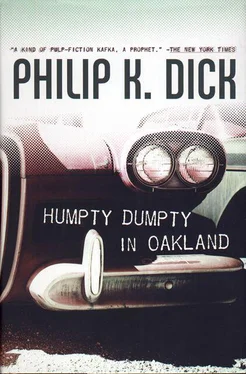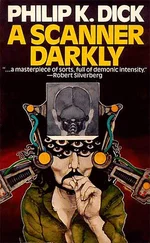He glanced at her. She was serious.
“She mean it,” Tootie said. “She given up on you. I see her give up on people before, but I surprised at her at this point. Is that the true way of God, to throw a man out? I say to hell with that, and all the Uncle Tom religion you spout.” Tootie’s voice rose until the dishes rattled; Mary Ellen shrank away, but she did not try to break in. “I really sick of you,” Tootie shouted at her. “You the hopeless one. You get out, you hear? You hear me?” He yelled with his face close to hers, until at last she scrambled to her feet. “Go on,” he yelled, jumping up. “Leave here and don’t come around again.” Then he dropped back down into his chair; he grabbed his coffee cup, squeezed it between both his dark palms, and then he slammed it from the table, skidding it across the floor so that it burst against the wall. Streamers of coffee appeared on the wall, as high as the picture of Jesus which Al had seen there as long as he had known them.
“You through?” Mary Ellen said presently.
“What do you know about old Al?” Tootie said. “Nothing.” His face had a stern, brooding expression. He shook his head. “Nothing at all.”
“I didn’t mean to stir up trouble,” Al said, going on with his eating. It had shaken him, that Mary Ellen had ordered him out; he could not bring himself to look at her. But now she came over and put her hand on his shoulder.
“Maybe I did done wrong,” she said. Her fingers caressed his shoulder, guileless fingers. “Listen, Al,” she said, drawing her chair over so that she was seated so close to him that her knees pressed against the rungs of his chair. “I see it, what Tootie said, and I saw it when you came in. All over him,” she said to her husband. “In him and around him.”
“See what?” Al said.
“That you going to die soon,” Mary Ellen said.
“Oh,” Al said.
“It don’t even bother you,” Mary Ellen said softly.
“No,” he agreed.
“Do something,” Mary Ellen said.
He went on eating. When he had finished he got up from the table. “How about it?” he said to Tootie.
Still brooding, still clasping and unclasping his hands, Tootie said, “Naw.”
“Really?” Al said. “You won’t get it for me?”
“Naw,” Tootie repeated.
“So long then,” Al said.
“I tell you why,” Tootie said. “You think you want it for getting back at them. But when you get your hands on it—” He studied the remains of the coffee cup and the spilled coffee. “Then you take it and stick it against your head and you give it to yourself. You not know that now. You not admit it or face it. But it still true.”
Is it? Al wondered. Maybe so.
“You haven’t seen anything of my wife, have you?” he asked them. “She hasn’t called here?”
“No,” Mary Ellen said. “Don’t you know where she is?”
Tootie said, “Did she leave you, man?”
“Maybe,” Al said.
“You just a humpty dumpty,” Tootie said. “You just stand there, stand around, while it all happen to you. You just perch and watch. So now you don’t even have a wife. A nice wife like that.”
“Why don’t you go and look for her?” Mary Ellen said.
Tootie said, “I bawled Mary Ellen out because she asked you to leave. Now I think she right. You ought to leave. You ought to go out and make it. And then come back and sit here. Okay?”
Putting on his jacket, Al left their apartment. They were both watching him as he shut the door after him.
He stood by the ruins of the Marmon, kicking at a cylinder that had been part of the ignition system. Most of the lot lay in darkness, but the neon sign of the coffee shop across the street gave him enough light to see again what he had already seen before; there was no hope of restoring the Marmon. Whoever had wrecked it knew what he was doing. The idea that had come grotesquely into his mind: it couldn’t be done, at least not without several weeks of work, and by then it wouldn’t matter. He had seen himself driving the ruined Marmon down the freeway, late, in the part of the night when there was the least traffic. All the way to the Richmond Bridge, and then at seventy-five miles an hour, into the steel and concrete side of the bridge and through and down into the water. But it was out of the question, and anyhow it was only a vision, a dream of his own death.
A hearse, he thought. All this time, all these months; was that what I was restoring it to be? A black, big, heavy, silent hearse wheeling along the deserted streets with me in it, on my back with my hands folded, my eyes open wide. My tongue, possibly, sticking out a half-inch, stiff, swollen; unless the undertaker pushed it back in or snipped it off. Me sticking out my tongue as they dragged me up the street, my tongue out at them even in death. The sons of bitches.
And then he had another dream, another vision; this one was so clear that he at once began to work on it. He did not hesitate. He hurried to the little basalt blockhouse, unlocked the door, and began searching around until he had found a paper bag left over from a lunch. He carried the paper bag outside, and, stooping down, began to sweep up sand from the lot. The sand had been put there to collect grease dripping from his cars. He swept it with his hands, pushing it into a pile, and then he dumped the sand into the paper bag.
Maybe I can get both of them, he said to himself. The Mercedes-Benz and the Cadillac. Unless, he thought, they have locks on the gas tanks. He could not remember.
While he stood there at the edge of the lot, holding the paper bag of sand and trying to remember, a car horn honked. He turned and saw an old but polished Cadillac at the curb. It had stopped, and the driver was watching him; he saw, in the reflected streetlight, the driver’s eyes.
Rolling the car window down, the driver leaned over and called out to him, “Hi!” It was a woman. For an instant he had it that she was his wife; he leaped all over and started toward her. But it was not Julie, and he knew that. It was Mrs. Lane. He went on toward her anyhow, more slowly, taking his bag of sand with him.
He stood on the sidewalk, saying nothing.
“Hello there, Mr. Miller,” Mrs. Lane said, her lips drawing back to show her carved golden teeth; the club and diamond sparkled. “What you doing down here in the dark? You appear to be having to pick up something you drop.”
He said nothing.
“You want me to drive up on the lot so my headlights make it show up better?” she said.
“No,” he said. “Thanks.”
“Guess what I doing,” she said, still leaning toward him. Now he could smell her perfume: it was so intense that it came out of the car and around him where he stood. “Here, I show you.” She shut off the motor of the Cadillac, squirmed over, opened the door on his side, and stepped out. She had on a knit dress and high heels and a hat; she was dressed up, obviously going out somewhere. “Don’t you think I look good?” she said.
“Yes,” he agreed. He had never seen her so spruced up, so sleek. Her hair, her skin, her eyes, everything about her shone. She had one single piece of jewelry on: a brooch near her collar.
“I been on a diet,” she said. “I don’t even have a, if you don’t mind my saying it, a panty girdle.” She patted her stomach. “I flat,” she said. “Flat as a griddle pan. After all these years. I flatter than a lot of those high-school girls that go by eating those Popsicles and sticking out and hunching.” She laughed. Turning in the streetlight, she showed him, with no need of comment, that she had on no bra, either. “Fact is,” she said, “I need nothing under this, and that exactly what I got on.” She raised her arms and skipped a step or two.
Читать дальше










